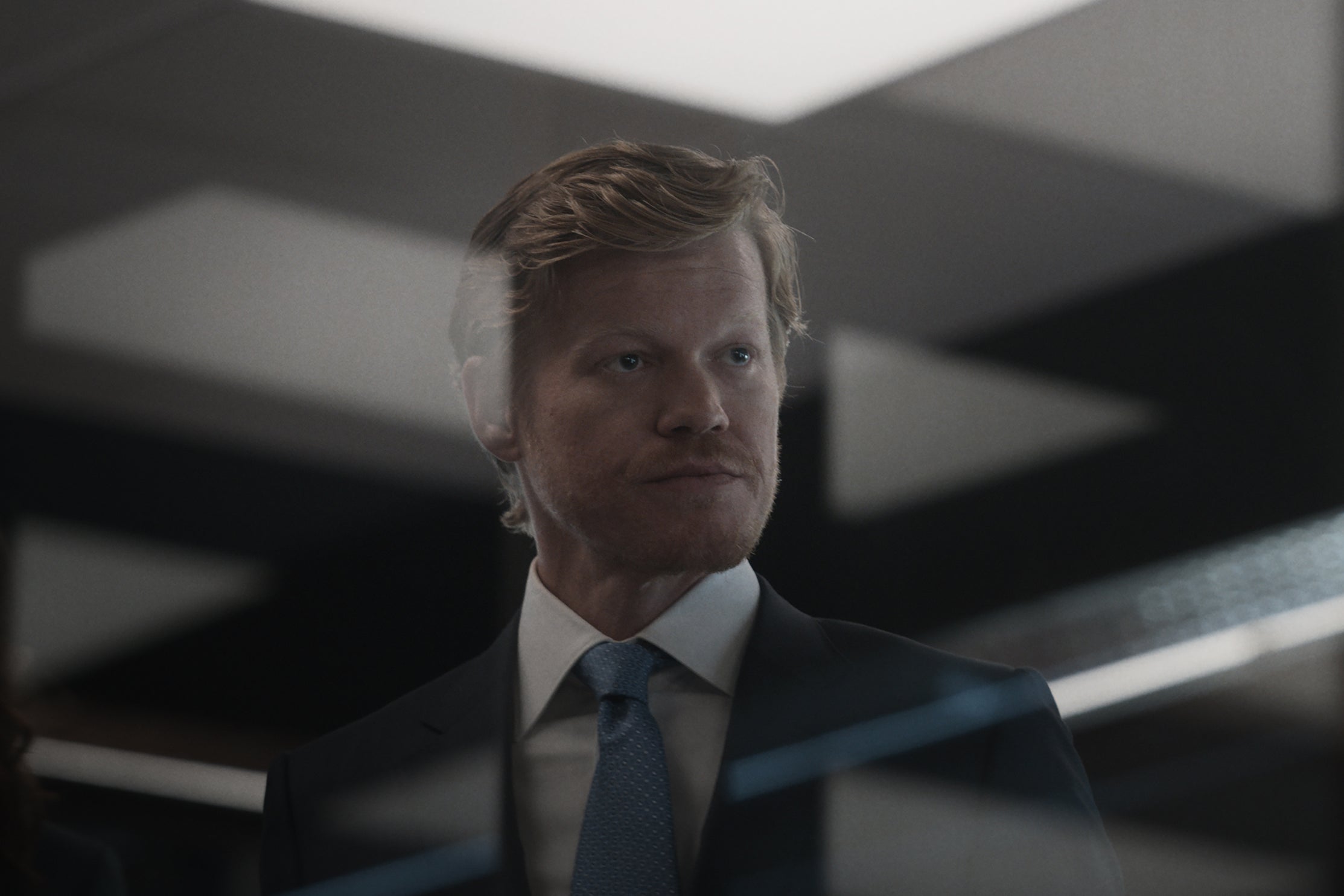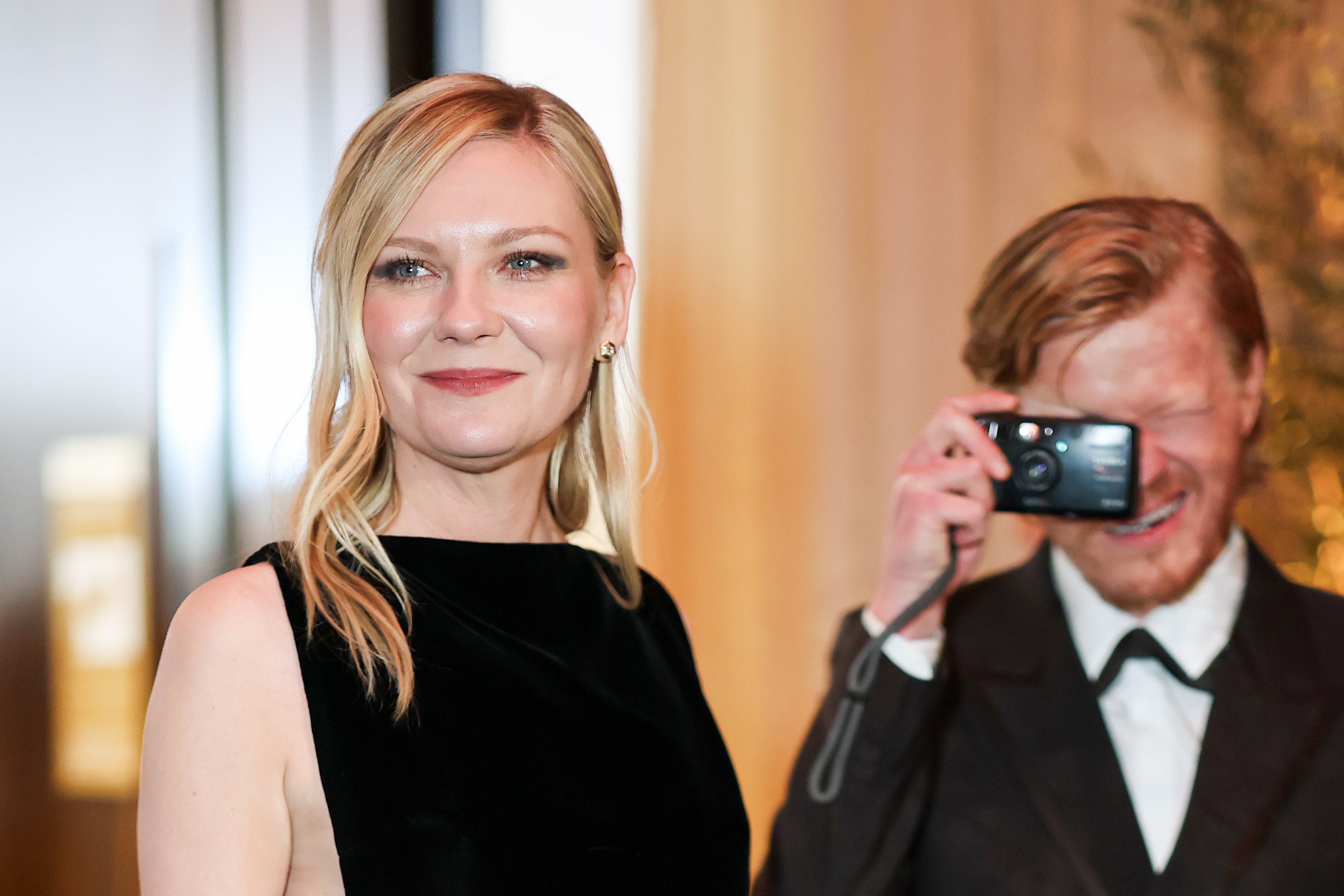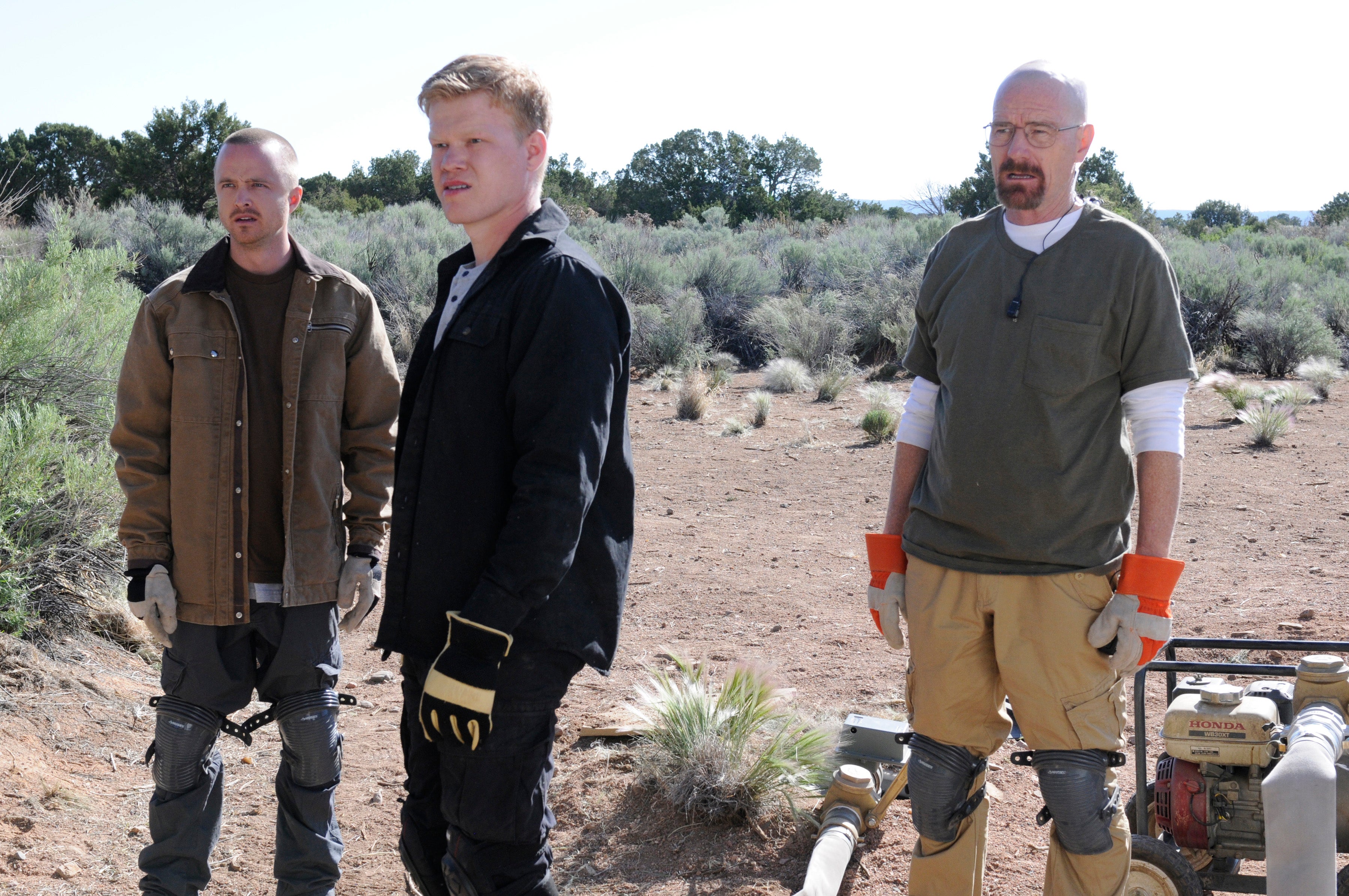
Imagine, if you will – what historians might call counterfactual thinking – a world in which Jesse Plemons, the actor who played Breaking Bad’s most chilling character, was one of the faces of the Star Wars sequel trilogy. If certain reports were to be believed, this very nearly happened. But maybe they weren’t to be believed. “Oh God,” Plemons tells me, grimacing. “I went in, gave a terrible audition. I had no idea what I was doing... it was just these scenes without any context. [Director] JJ Abrams was really nice, but I was spiralling.”
In hindsight, it’s probably a good thing that Plemons – then fierce with the heat of his Breaking Bad role as the violent, empathy-free pest-exterminator turned meth cook Todd – never got too close to that galaxy far, far away. There’s something about Plemons that’s too credible for something as extraterrestrial as Star Wars – a rare and offbeat verisimilitude. Put him in a Star Wars movie, and you might have people running out of the cinema mid-scene just to check for themselves that they are safe; that a Death Star is not, in fact, hovering menacingly above the horizon.
And besides, the run of projects that followed that rejection, from prestige TV hits (Fargo) and intimate dramas (Other People) to substantial Oscar-winners (The Power of the Dog; Judas and the Black Messiah), established him as one of the most sought-after character actors around. Just ask Steven Spielberg, Martin Scorsese, or Yorgos Lanthimos.
I am sitting with Plemons on a grey February afternoon, in a small hotel room overlooking the streets of central London. The 36-year-old is dressed sharply – herringbone coat, jean shirt and boots, his hair worn long and swept back. Early in his career, Plemons would often be likened to a young Matt Damon, but the truth is there’s no mistaking him for anyone else. He has one of those inimitable larger-than-life faces: narrow, mercurial eyes, and a wide, taut hammock of a grin.
He’s looking lean, too. There has, in fact, been a marked change to his body over the past few years. “It is one of the many strange things about this job,” he says, slowly.
“I first gained weight for Black Mass,” he explains – the 2015 crime film in which Plemons played real-life mafioso Kevin Weeks opposite Johnny Depp’s Whitey Bulger. “I never imagined getting to play a part like that. [Gaining weight] was a decision I made at that age, given that opportunity for that director – and I was playing a real person. I don’t regret it. But it was very easy to put the weight on, and much more difficult taking it off. I don’t know if it’s something I would do again – because it did mess me up a bit.”
He pauses, then goes on. “I felt like that decision I made sort of dictated the types of parts I was being asked to play, and then started to seep into my own identity... which wasn’t necessarily who I was before that.”
It took getting cast in Civil War, Alex Garland’s 2024 dystopian thriller, for Plemons to lose weight, through fasting and lifestyle changes. (He appears in just one sequence, as a soldier bent on killing strangers according to how “American” he perceives them to be – being the wrong “kind of American” brings execution.) “Being asked to play that character and being unable to see him at my current weight... that kind of snapped me out of it,” he says. “As well as having young kids. And I just got a handle on it again. Having lost the weight, aside from feeling better, it does feel like I’ve opened another door to potential parts I can play.”
Plemons’s threatening bit part was the most talked-about sequence in Civil War. Garland’s provocative story follows roaming war journalists in an imagined near-future: the US is in the death rattle of a fascist president’s third term, with the ideologically divided nation having erupted into violent conflict. The parallels with the contemporary US are many and glaring. It’s a similar state of affairs in Zero Day, a six-part thriller just released on Netflix, which touches on a range of fraught, ripped-from-the-headlines ideas: a US president with cognitive impairment; the surveillance state; warped conspiracist content-mongers; cyberterrorism.
“With a lot of the projects I’ve been working on of late, the parallels [with reality] are kind of undeniable,” Plemons says. “But for actors, there’s always this hyperfocus on the characters, the relationships – the human aspects of it. If other people draw those conclusions, great.”

Plemons has a habit of stroking his chin when in thought, flashing the faded tattoo on the inside of his finger. It reads “TVZ” – meaning Townes Van Zandt, the brilliant and troubled singer-songwriter (and fellow Texan) who died back in 1997. Van Zandt sang about misfits, misanthropes, people in love – it’s easy to guess why his music resonated with Plemons, who has made a career out of playing unconventional men.
“Most people aren’t one thing,” he says, pensively. “They have a lot more going on beneath the surface than maybe we would like to think – good and bad. When I’m reading a script, I’m interested in someone that doesn’t immediately reveal themselves or fit into some category. I think it comes from a place of wanting to understand... and they’re also just more fun.”
It was the chance to play a character like this that prompted Plemons to sign up to Zero Day. Robert De Niro fronts the series as George Mullen, a former president who heads up a controversial, civil-liberty-threatening task force in the wake of a massive cyberattack. Plemons is Roger, his former aide, now a political fixer – with more than a few secrets. “I really loved Roger, how slippery he is,” Plemons says. “There’s an unpredictable quality to him.”
I don’t think my grandma has seen ‘Kinds of Kindness’, and I hope that she never does
Another factor in his decision to sign on to the series – aside from the “captivating” script – was the chance to work with creator Lesli Linka Glatter again. (He previously worked with her on the 2023 miniseries Love & Death “and just loved the experience”.) Plemons has worked with De Niro before, too – on the Scorsese crime epics The Irishman and Killers of the Flower Moon. “It’s one of those things I never even thought to dream about,” Plemons says. “You don’t even allow that thought... he’s one of the best actors of all time. Those few scenes I had with him in The Irishman, I was doing just everything I could to not freak out.” With Zero Day, at least, he has “gotten a little more comfortable with the reality of working with him”.
What’s oddly striking about Zero Day is just how normal Plemons’s character seems, coming off a year that gave us Civil War and Kinds of Kindness. This latter film, a tar-black triptych from The Lobster director Lanthimos, saw Plemons (like most other cast members) take on three different roles. In the first story, he plays a man whose entire life is controlled by his boss (Willem Dafoe), down to the smallest detail. In the second, he is a husband who becomes convinced that his wife (Emma Stone) has been replaced by a near-identical replica, so he convinces her to mutilate herself. In the third, he portrays a member of a sex cult hunting for a messiah figure with supernatural powers.
Even if you haven’t seen the film, you can probably surmise from the above that this was not a crowd-pleaser. (Except with festival jury crowds, that is: Kinds of Kindness won Plemons the Cannes Film Festival award for Best Actor.) For Lanthimos, it was a return to the sort of dark, off-putting surrealism that defined his early films, after he’d become an unlikely awards darling with the fractionally more accessible The Favourite and Poor Things.
“It’s not a movie for everyone,” says Plemons, “which is really exciting – that there are people willing to take these risks. I don’t think my grandma has seen it, and I hope that she never does,” he adds, letting out a big, sinewy chuckle.

It’s hard to place just why Plemons has such a knack for playing creeps and oddballs. It helps, for one thing, that his face is constitutionally hard to read. Plemons seems to have a whole catalogue of microscopically different squints at his disposal, each conveying something completely new (cunning; suspicion; distress; vacuousness; anger). And yet, off camera, this opacity does not read as frightening in the slightest.
While Kinds of Kindness feels unfettered in its breaking of taboo, Plemons has mentioned one scene being a “step too far”. The sequence, involving Plemons’s first character and his wife, played by Hong Chau, was cut during the edit. What was so bad about it, I ask? “I don’t even want to say,” he says, an unaffected graveness in his voice. “A marital – ” He stops himself. “It was just one of those scenes that make you feel sick.”
What’s great about Lanthimos’s work, he says, is that “all of the surrealism and absurdism and horror – sometimes that feels more like life than the super-realistic things. Because life is very strange and disorienting and dizzying at times.” It’s no surprise that the two of them, plus Stone, are set to collaborate again on the forthcoming Bugonia. (The official logline says that the film “follows two conspiracy-obsessed young men who kidnap the high-powered CEO of a major company, convinced that she is an alien intent on destroying planet Earth”.)
Plemons has, by this point, been knocking around the industry for three decades. The son of a firefighter father and a special educational trainer mother, Plemons started out as a child actor – a backstory he has in common with his wife, Kirsten Dunst. The pair got to know each other while playing a married couple in Fargo’s brilliant second season – he a loyal and long-suffering butcher, she a stifled homemaker, dippy and chaos-causing – but didn’t get romantically involved until a while after. (Since coupling up, they have appeared in The Power of the Dog and Civil War together, both earning Oscar nominations for the former, and now have two children.)

Being a child actor, says Plemons, “exposed me at such an early age to so many different types of people. Had I not gotten into it so young, I still feel like I would have been drawn to it. But thanks to my parents making a split decision – taking me to this commercial audition – I learnt that it was possible. That it was in the realm of possibilities to do this for a living.”
Where Dunst found early stardom in films such as Little Women and Jumanji, Plemons was more of a jobbing child actor; he got his breakthrough at 18, when he was cast in the American high-school football drama Friday Night Lights as Landry Clarke, a sportsphobic outsider in a football-obsessed college town. That series, which ran for five seasons, was critically adored, but relatively little-seen. Breaking Bad was a different story: when Plemons signed on to the crystal meth saga, it was in the throes of becoming a full-blown pop-cultural phenomenon.
His character, Todd, is among the nastiest pieces of work in Plemons’s repertoire, a ruthlessly practical lackey with ties to the white nationalist underground. Plemons has previously suggested that the character could be “on the spectrum”. “I don’t know if I still agree with that,” he says. “I guess in some ways it’s helpful, in other ways it’s limiting, to classify a character like that. It’s obvious that there’s something in him that prevents him from understanding the gravity of his actions.”

It’s a testament to Plemons’s range that he’s been able to wriggle free from Breaking Bad; Todd is the kind of memorably evil character that can cling to an actor like a tick. “Breaking Bad was just so wrapped up in the zeitgeist when it was coming out,” Plemons says. “Even by the time that I entered into it, it had such a devoted fanbase. I feel like I still haven’t fully lived that down... Some people will probably still look at me – and refer to me – as Todd, or any of the other nicknames that the character was called.”
He laughs, knowingly. (For years, Plemons was dogged with the sobriquet “Meth Damon” – a reference to both Breaking Bad’s drug of choice and the aforementioned movie-star resemblance.) “It is a strange thing to meet the people who only know you as a part. They’re looking at you as this different person, who has done some awful things.”
Our time is nearly up, and I am thinking, again, about Star Wars. Within Plemons’s generation, it’s commonplace for any young actor with a jot of promise to be shoehorned into the world of franchise blockbusters; part of the reason that Plemons’s body of work has been so strong is that he’s largely avoided forays into the mainstream popcorn-movie sphere.
When I ask if this was a deliberate strategy on his part, Plemons seems to bristle, ever so slightly. “Well, I did a movie called Jungle Cruise; I did a movie called Battleship,” he says, with a droll, inscrutable smile. “I had a great time in both of those movies. But... is it a conscious decision? Most of my decisions don’t feel all that conscious. Most of them just feel like, ‘Ah, s***, I’ve got to do this.’”
Wherever that feeling is coming from – his conscious, his unconscious, his gut, or some freak clairvoyance – it’s too late to stop listening now.
‘Zero Day’ is streaming now on Netflix







